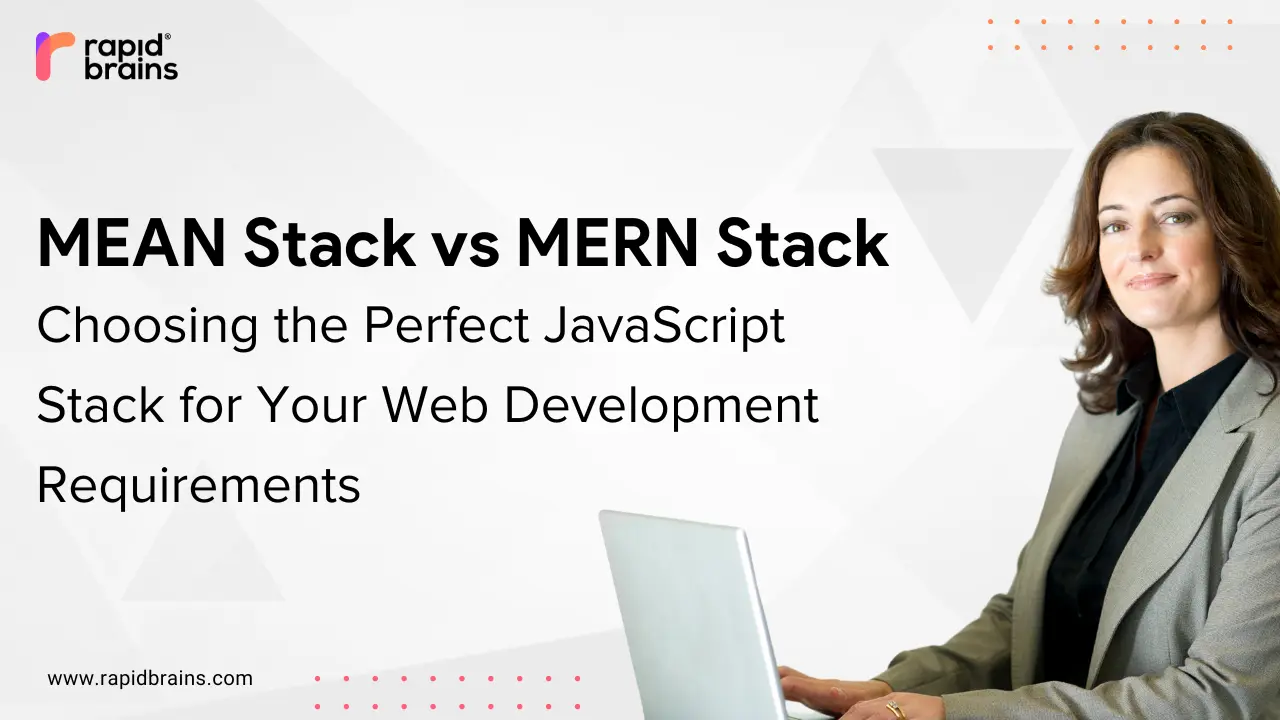
In the current web development market with a lot of competition, technology stack selection plays an important role in developing high-performance, scalable applications. Two of the most popular full-stack JavaScript frameworks used are the MEAN stack and MERN stack. Both deliver end-to-end JavaScript environments but in a varying manner because both have a great deal to offer. This blog will compare and contrast MEAN and MERN stacks in-depth, assisting you in deciding what is best suited for your project.We’ll also talk about why it is necessary to deploy experienced MEAN stack developers, MERN stack developers, and how RapidBrains can assist you in hiring remote developers effectively.
What is MEAN Stack?
The MEAN stack comprises MongoDB, Express.js, Angular, and Node.js. MongoDB is a NoSQL database, offering scalability and flexibility. Express.js is a web application framework for Node.js, simplifying the creation of APIs and web applications. Angular, a front-end framework by Google, provides a robust set of tools for building dynamic web applications. Node.js, a JavaScript runtime, enables running JavaScript on the server side, known for its speed and scalability.
What is MERN Stack?
The MERN stack includes MongoDB, Express.js, React, and Node.js. MongoDB and Node.js remain the same as in the MEAN stack, while React replaces Angular as the front-end framework. React’s component-based architecture and virtual DOM make it a popular choice for building interactive user interfaces.
Advantages of MEAN Stack
The MEAN stack boasts several advantages, particularly in its use of Angular. Angular provides a comprehensive framework with features like routing, form handling, and HTTP client functionality, making it well-suited for complex applications. Additionally, Angular is written in TypeScript, which offers static typing and helps in detecting errors at compile time. Another key feature of Angular is its two-way data binding, simplifying the process of keeping the user interface in sync with the underlying data model. These features collectively make the MEAN stack a powerful choice for developers tackling sophisticated web development projects.
Advantages of MERN Stack
React, a key component of the MERN stack, offers several advantages that contribute to efficient web development. One such advantage is its component-based architecture, which encourages code reusability and maintainability. This approach simplifies development by allowing developers to reuse components across the application, reducing duplication and making code easier to manage. Additionally, React’s virtual DOM (Document Object Model) enables fast rendering of UI components by creating a lightweight representation of the actual DOM. This results in improved application performance, especially in complex applications with frequent updates to the UI. Furthermore, React benefits from a rich ecosystem of libraries and tools, which enhances developer productivity and simplifies complex tasks. This ecosystem provides developers with a wide range of options for extending React’s capabilities and solving common development challenges, making it a popular choice for building modern web applications.
Disadvantages of MEAN and MERN Stack
Both the MEAN and MERN stacks present challenges in terms of learning curve and complexity. For beginners unfamiliar with JavaScript and its frameworks, both technology stacks can have a steep learning curve. JavaScript itself can be complex, and adding frameworks like Angular or React to the mix only adds to the complexity. The full-fledged framework in MEAN, particularly Angular, can be daunting for newcomers due to its comprehensive feature set and the need to understand concepts like two-way data binding. Similarly, the component-based nature of React in the MERN stack introduces its own set of challenges, as developers need to grasp the concept of components and how they interact to build a cohesive user interface. Overall, while both technology stack offer powerful capabilities, they require dedication and effort to master, especially for those new to JavaScript and web development.
What They Have in Common?
Both the MEAN and MERN stacks share commonality in being full-stack JavaScript frameworks, enabling developers to utilize JavaScript for both front-end and back-end development. This unification streamlines the development process by eliminating the need to switch between languages, promoting code consistency and developer efficiency. Additionally, both technology stack leverage MongoDB as the database and Node.js for server-side development. This cohesive approach ensures consistency in data handling and server-side logic, simplifying the development process and enhancing overall application performance.
When to Choose MEAN Stack?
MEAN stack is the preferred choice when you need a comprehensive framework with advanced features for complex applications. It excels in projects that require extensive routing, form handling, and HTTP client functionality. The robustness of Angular in the MEAN stack makes it ideal for managing the complexities of large-scale applications, providing a full-fledged framework to handle various aspects of web development effectively.
When to Choose MERN Stack?
MERN stack is the ideal choice if you prioritize flexibility and efficiency in building user interfaces. It is also suitable for lightweight applications that require a more streamlined approach to UI development. With React at its core, the MERN stack offers a component-based architecture that promotes code reusability and simplifies the development of interactive user interfaces. This makes it particularly well-suited for projects where agility and responsiveness are paramount.
When Not to Choose MEAN or MERN Stack
When considering a technology stack for your project, there are scenarios where the MEAN or MERN stack may not be the best fit. If you’re looking for a simpler technology stack with fewer components to avoid unnecessary complexity, exploring other options might be more suitable. Additionally, if you’re not proficient in JavaScript or prefer another programming language, MEAN and MERN may not align with your preferences.
Importance Of Hiring MEAN and MERN Stack Developers
MEAN and MERN stack developers play a crucial role in modern web development, offering specialized expertise that can significantly impact the success of a project. These developers are skilled in full-stack JavaScript development, proficient in both front-end and back-end technologies. MEAN developers excel in Angular, known for its comprehensive features and robust framework, while MERN developers are experts in React, renowned for its component-based architecture and efficient UI development. Their specialized knowledge allows them to leverage these frameworks effectively, ensuring a seamless integration of components and a smooth user experience.
Hiring MEAN stack developers and MERN stack developers brings several benefits to a project. Their familiarity with the tools and libraries associated with their stacks streamlines the development process, reducing time and costs. They are also adept at problem-solving and debugging, ensuring a high-quality codebase that meets industry standards. Furthermore, their adaptability and innovation enable them to stay ahead of trends, incorporating cutting-edge solutions into projects. Overall, MEAN and MERN stack developers possess a comprehensive skill set and a commitment to quality, making them valuable assets for any web development project. If you are looking to hire MERN stack developers, MEAN stack developers, or remote developers for your project, their expertise and experience can help drive your project’s success.
Conclusion
Both the MEAN stack and the MERN stack offer powerful tools and technologies for building modern web applications. The choice between the two depends on your project requirements, development expertise, and preference for specific frameworks. Consider your project needs and your team’s skillset to make an informed decision that aligns with your goals




